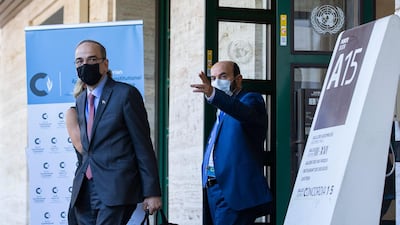Members of Syria’s opposition delegation said on Tuesday they did not expect a breakthrough on constitutional talks in Geneva a day after they were paused.
Syrian government, opposition and civil society delegations resumed meetings in the Swiss city to discuss a possible new constitution after participants tested positive for the coronavirus, forcing the proceedings were put on hold.
The step is seen by the UN as a prospective “door-opener” to a final resolution of the country’s devastating nine-year civil war.
"We don't have high expectations. The regime doesn't want to get into a political process, just in appearances. The regime claims it is interested in a solution but in reality only a military option was on its agenda," Yahya Al Aridi, a spokesman and member of the delegation sent to the Geneva, told The National.
The office of the UN envoy for Syria, Geir Pedersen, said late on Monday it had received confirmation that three members of the Syrian Constitutional Committee Small Body tested positive for Covid-19.
Mr Al Aridi said the opposition members were screened for infection before boarding their flights to Geneva and did not have the virus.
“We know that the opposition delegation were tested before leaving and when they arrived everything was fine, but the other side either didn’t test well or some didn’t test at all,” he said.
The opposition is unsure when the talks might resume and says it suspects the regime has a hidden agenda to postpone the discussions.
“We have doubts about this because we got used to their tricks and excuses in order to obstruct the peace process from when it started” in 2012 until today, Mr Al Aridi said.
The opposition’s main goal is to bring Syria back to life, “but the other side is fond of keeping this bloody chair on the chest of Syrians,” he said.
Negotiations would be guided by UN Security Council resolution 2254, which refers to the establishment of credible and inclusive governance, the process for drafting a new constitution and free and fair elections.
“The UN has issued a resolution and it should work hard on implementing it, of course it’s an abstract body that is made up of powers, US, Russia, UK, France and China, Russia,” Mr Al Aridi said.
But the world body must work on reaching a deal.
“We want to achieve something for our people. The last thing [the regime] cares about is the people,” he said.
The meeting in Geneva this week was meant to be the first of its kind in nine months.
An earlier meeting, planned for March, was postponed due to the pandemic.
Mr Pederson was expected to host the three 15-member teams from Syria, while major regional and world powers – Iran, Russia, Turkey and the US – were scheduled to be on the sidelines during the week-long gathering.
War broke out in Syria in 2011, leading to hundreds of thousands of deaths and the exile of millions from their homes.
The opposition says it wants a new constitution drafted, while the government says the current charter should be amended.
Mr Al Aridi said the opposition wants a new constitution that respects all Syrians, one that will take responsibility to the country.
“You see, those who are not respected by this regime are killed, starved, humiliated and the country is devastated,” he said.
The blueprint will have to be different, Mr Al Aridi said – it must respects rights, and there should be a separation between administrative and legislative matters.
“But the regime doesn’t want that – they want to be in full control,” he said.


